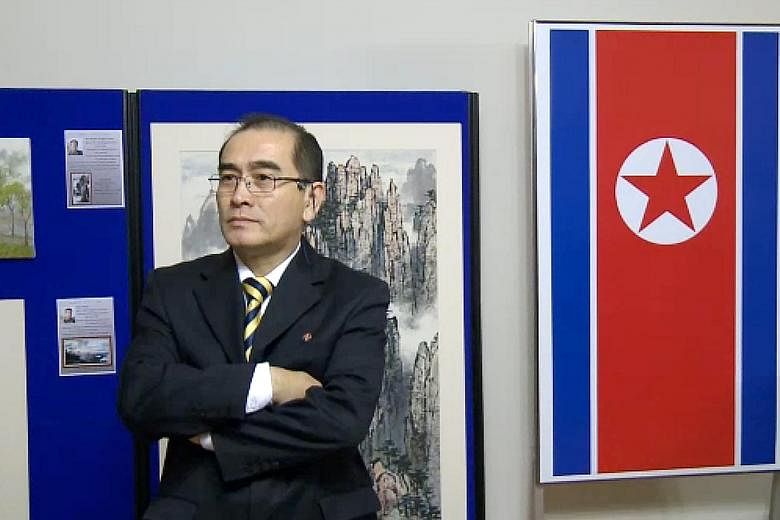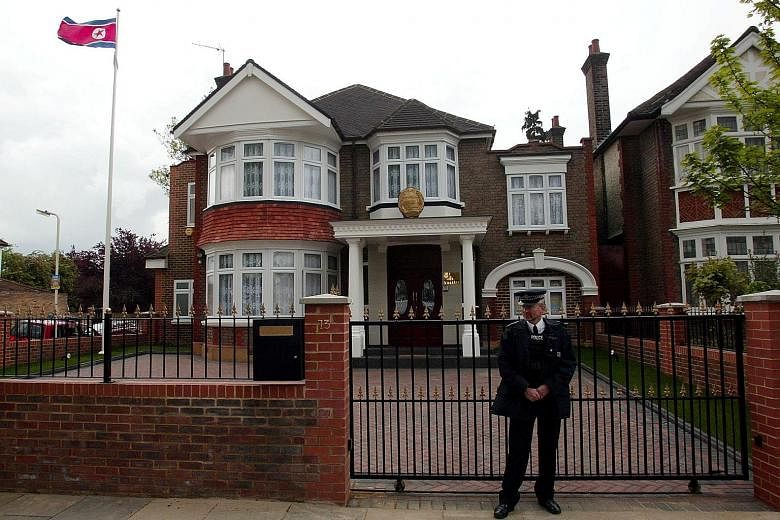SEOUL • As the No. 2 North Korean diplomat in Britain, Mr Thae Yong Ho seemed to embrace the trappings of a comfortable life in a capitalist capital thousands of kilometres from dreary North Korea, never hinting at disloyalty.
He served in London for 10 years, an unusually long stint often attributed to his good family ties.
So it was a shock on Wednesday when South Korea announced that Mr Thae had betrayed his hermetic homeland by becoming the most senior North Korean official to defect in nearly two decades.
-
2,706
-
Number of North Korean defectors arriving in South Korea in 2011
1,275
-
Number of North Korean defectors arriving in South Korea last year
749
-
Number of defectors arriving in South Korea in the first six months of this year
The North's leader Kim Jong Un has since sent security agents overseas to monitor government officials and business personnel in the wake of the high-profile defection, a source familiar with the regime told Yonhap news agency yesterday.
Mr Kim has also ordered the families of North Korean diplomats and overseas workers back to the country, the anonymous source added.
How and when Mr Thae eluded his colleagues at the North Korean Embassy, who are required to monitor one another to thwart treason, was not clear.
But a South Korean government spokesman, Mr Jeong Joon Hee, said at a news conference that the diplomat had arrived recently in South Korea with his wife and family, proclaiming disillusionment with Mr Kim's increasingly isolated government.
Mr Jeong did not specify how many family members had accompanied Mr Thae or whether any remained in North Korea, where they could be at risk of reprisal. Nor did he explain the route taken by Mr Thae, second in rank to ambassador Hyon Hak Bong in London.
"We see his defection as a sign that some of the core elite in the North are losing hope in the Kim Jong Un regime," Mr Jeong said, "and that the internal unity of the ruling class in the North is weakening."
South Korean officials expressed similar conclusions in April when 13 people working at a restaurant run by the North Korean government in China fled to the South. Officials said that unusual group defection reflected growing dissatisfaction in the North.
-
Privileged background
-
Mr Thae Yong Ho, 55, is well known in the British news media, acting as the embassy's main point of contact for British correspondents travelling to Pyongyang.
He had lived in London for a decade, trusted because of his family's impeccable legacy in North Korean history.
Mr Steve Evans, a BBC Korea correspondent who had met Mr Thae in London, remembered the North Korean as a middle-aged man who appeared to enjoy life in the suburbs of west London.
He frequented a curry restaurant and liked to talk about family and health, including worries about the onset of diabetes, Mr Evans said. Mr Thae switched to tennis after his wife complained about his obsession with golf.
He was one of the North Korean escorts seen accompanying leader Kim Jong Un's elder brother Kim Jong Chol to an Eric Clapton concert in London last year. The diplomat was scheduled to return to Pyongyang this summer with his wife and son, Mr Evans reported.
"But he seemed so British," he wrote. "He seemed so at home. He seemed so middle- class, so conservative, so dapper. He had never given any hint of disloyalty to the regime, not a flicker of doubt."
Mr Thae and his wife Oh Hae Son, 50, hailed from a coveted elite family background in the North.
His father, Mr Thae Byong Ryol, was a comrade-in-arms of the North's founding president Kim Il Sung when Mr Kim was a leader of Korean guerillas fighting Japanese colonialists in the early 20th century, South Korean news agency Yonhap reported.
Ms Oh is a relative of another former Korean partisan guerilla named Oh Baek Ryong, mass-circulation daily Chosun Ilbo reported.
Offspring of the former guerillas occupy key posts in the Pyongyang government, constituting a core elite buttressing Mr Kim Jong Un's regime and living in luxury that ordinary North Koreans can only dream of. They are allowed to study abroad, as Mr Thae and his sons did, in China and in Europe.
"A North Korean diplomat usually works in overseas missions for three years, but Thae had worked in London for 10 years, mainly because of his good family ties," a source familiar with the matter told Yonhap yesterday.
NEW YORK TIMES
But analysts have cautioned against drawing such conclusions.
Dr Cheong Seong Chang, an expert on North Korea at the Sejong Institute in Seoul, said that isolated defections like Mr Thae's should not be taken as an indication of instability in the North, and that there was no sign of an organised challenge to Mr Kim's rule.
Others were cautious because some North Korean defectors to South Korea have not always found happiness, a message that may have found its way back to Pyongyang, the North's capital, and elsewhere.
"I think we will continue to see senior defections, but at a trickling pace," said Dr Jae H. Ku, director of the US-Korea Institute at the Johns Hopkins University's School of Advanced International Studies in Washington. "I don't think we are at a point where we will see massive defections by elites because these elites have not yet found ways to live comfortably in South Korea."
Still, Mr Thae's defection could yield a trove of intelligence information. It came as relations between the Koreas had worsened over the North's nuclear weapons and missile programmes, tested in defiance of international sanctions.
The last time a North Korean diplomat of such high rank defected was in 1997, when Mr Jang Seung Gil, the ambassador to Egypt, sought refuge in the United States with his younger brother, a North Korean diplomat in Paris.
Inklings of a betrayal in the North Korean Embassy in London surfaced a few days ago when a South Korean mass-circulation newspaper, JoongAng Ilbo, quoted an anonymous source saying a diplomat there had defected in early August after "painstaking preparation". By the time other embassy officials realised this, the newspaper said, the diplomat had fled.
South Korean officials have cited recent defectors as proof that some North Korean elites abroad were defecting rather than facing persecution, as it became increasingly difficult to perform their missions under tightened international sanctions.
The number of North Korean defectors arriving in the South dropped from a high of 2,706 in 2011 to 1,275 last year, as Mr Kim tightened border control with China, the first stop for almost all asylum-seekers.
The number of defectors is picking up again this year, with 749 in the first six months.
NEW YORK TIMES


